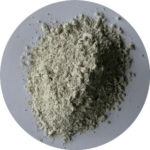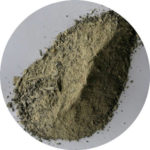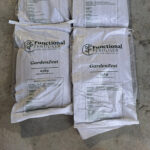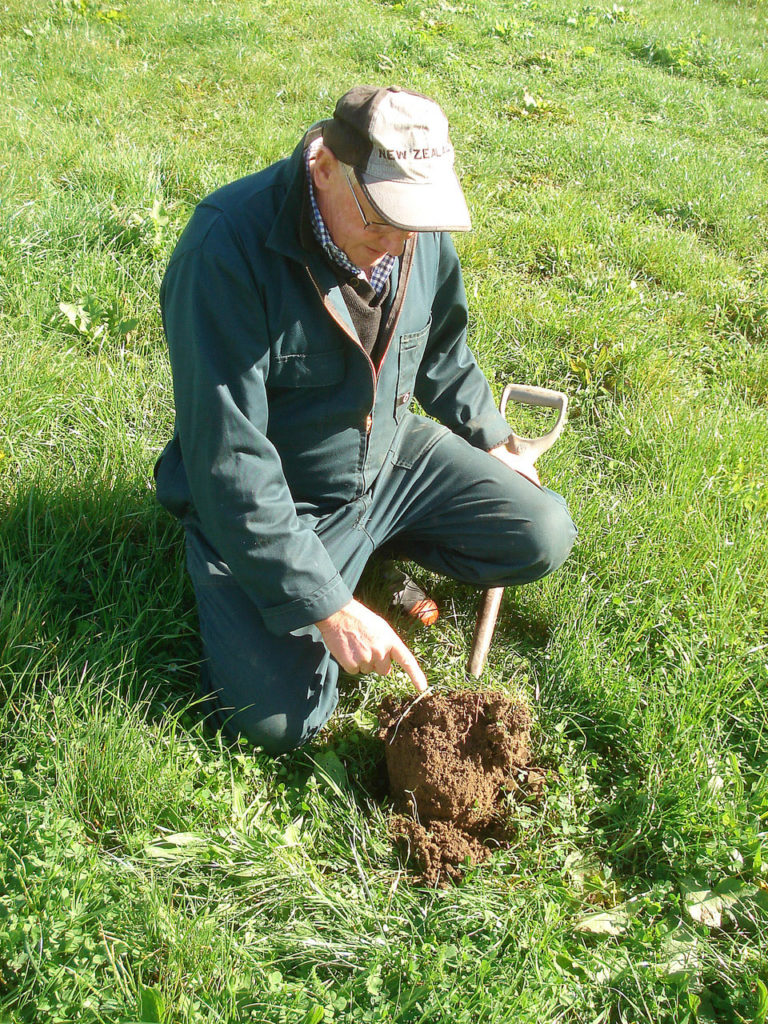 By Lloyd Chapman – OTAKI MAIL, MAY 2019
By Lloyd Chapman – OTAKI MAIL, MAY 2019
The three Pritchard brothers, David, Nigel and Stuart are old Ōtaki identities.
This story involves Stuart, whose cv talks of dairy farming, horticulture, property development, land and building amongst other career activities.
Stuart recently was guest speaker at Energise Ōtaki’s meeting, talking about Organic beef farming at Forest Lakes. His story was compelling and warranted further investigation. To the sceptic, organics is the province of sandal-wearing hippies or Green Party supporters. Stuart Pritchard doesn’t fit this profile at all. His appetite was whetted at a National Party Bluegreen function at Tatum Park in 2012. Bluegreens are the National Party’s advisory group on environmental issues. Stuart’s curiosity was aroused, and in his words: ‘I thought I’d give it a go. Nothing ventured nothing gained’.
The Pritchard family have owned property at Forest Lakes for over half a century. West of state highway one, it’s rolling land, bounded by the railway line. The land has great character, deriving probably from old dunes that have had a buildup of topsoil over thousands of years. To the south there is a wetland, that is considered a taonga by the Wellington Regional Council.
For decades, Stuart’s land was tenanted by contractors and sharemilkers, and on the expiry of the lease in 2012, he was taken aback by the way intensive grazing had degraded the pasture. His land comprises 15 Ha in pasture, and a similar amount of wetland. On a trip to England, Stuart was impressed with the more feminine rural countryside, where trees were often seen in the pasture. He decided that his pastures could be softened and improved with planting of exotic trees, and sixteen years later every one of his 15 paddocks has one or more trees, all fenced against damage by stock. Not quite an English countryside, but visually great, and the stock enjoy the diversity and shelter.
Stuart’s next step was to seek organic certification. This is an expensive and arduous process, with a myriad of conditions that must be met. Stuart achieved AsureQuality certification as a Conversion to Organic Beef Farm in 2016.
You aren’t allowed to use chemicals on an organic farm. This means no drenches, no Roundup. no high- Nitrogen synthetic fertilisers.
Drenching isn’t an issue. Young animals after purchase initially go into a ‘quarantine’ paddock, where they remain until all their internal parasites have been purged. Thereafter they won’t see a chemical drench again. And they are unlikely to see a vet, either. Stuart said he recently had to call the vet to attend to an injured beast who had a run-in with a fencepost. ‘We don’t have you on our books’ was the reply from the vet centre. ‘No, we’ve never needed a vet’ was Stuart’s response.
Stuart buys in Angus-Hereford cross heifers as yearlings, and sells them in the Spring when they reach two years and weigh around 290kg carcass weight. The Pritchard approach to stock management is straightforward, but clever. He has 12 paddocks, and works on a 40-45day rotation. Stock have two 2 days per break before they are moved on to the next paddock, leaving the pasture to regenerate, so that the pasture is not hard-grazed, and can recover quickly.
What first strikes you is the health of the paddocks. Stuart acknowledges that the stock seem happy to eat everything: grass, clover, ‘weeds’. Its really a Herbal pasture, a mix of many grasses and clover. Clover is the King of the pasture. He has no need for chemical weed control, and the only intervention practiced is a bit of thistle grubbing. The fast rotation break policy ensures that the cattle don’t overgraze the pasture too low.
During the recent unusually dry Summer, it was evident that Stuart’s pasture was holding up well, while paddocks in adjacent farms were under stress or ‘browning out’. Further evidence that the organic regime encourages improved soil quality, and worm activity with it, deeper rooting, and thus less susceptible to drought and stress periods
So why is the pasture so good? Stuart says it’s down to Functional Fertiliser, which is an organically-approved blend of reactive phosphate rock, lime, dolomite and soft carbons and carbohydrate loaded with a wide range of beneficial fungi and bacteria selected for their ability to speed nutrient cycling and build humus.
Stuart demonstrated the depth of rooting and the friability of the soil with a spade-depth that showed roots going right down, and crumbly soil that was full of microbes and humus.
The benefits were abundantly obvious.
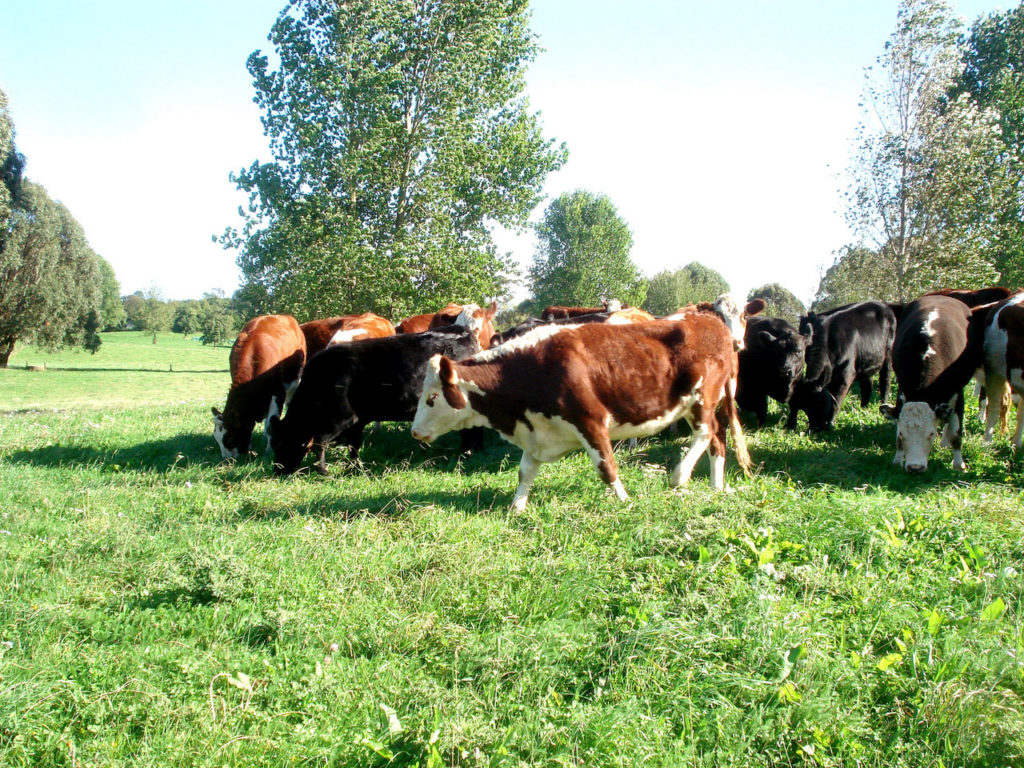
After an inch of heavy overnight rain, there was no evidence of soil ‘pugging up’ or compaction. A further benefit of not using synthetic Nitrogenous fertilisers is the lack of run-off, to the wetland, which WRC report to be in excellent health, and a lack of Nitrogenous leachate or Nitrous Oxide which mainly comes from fertilisers and animals; clover has the ability to capture the natural nitrogen free from the atmosphere.
Local beekeeper Gary Milne has hives on the Pritchard farm. ‘He has an abundance of grass, which recovers very quickly after grazing. Not only does the pasture do well, so do my bees’ he said. The honey from an organic pasture is in high demand, too.
Respected Landscape Architect Frank Boffa knows the farm well, having supplied expert consultancy for Pritchard. ‘It’s a remarkable place’, he said. ‘Stuart has demonstrated that organic farming can work, and in my opinion this demonstrates that it can work at a large scale. Organics has had a remarkable effect on the place’.
Functional Fertiliser’s Peter Burton talked of how his fertilisers had helped Stuart: ‘ They are the result of work we started on our own dairy farm in the mid 1980’s believing there had to be something better than superphosphate, muriate of potash fertiliser inputs, and steadily increasing animal ill-health costs.
None of the component parts of the products are new or unproven, what is different is the way in which they have been combined, with the results being greater than the sum of the parts. Stuart took some time to be convinced, and to his credit he hung in, changed his grazing management and is now enjoying the benefits, along with numerous other farmers throughout the country.
DoloZest and CalciZest, our two products that form the base of all our nutrient programmes, were designed to improve physical soil structures, increase the rate at which nutrient is cycled, build humus, and provide a genuinely sustainable farming experience.
Many years of monitoring show that our programmes grow up to 30% more annual drymatter than the best nitrogen-dependent conventional systems. Nitrogen, primarily urea, dependent systems rely on soil carbon for the short term increase in growth that occurs after each application.’
Rod McMillan, ag consultant knows Stuart’s property well. ‘Functional fertiliser’s Peter Burton has certainly provided a fertiliser solution to the old 0800 urea recipe which I still see going on in the district today. But more than this, Peter takes a whole-of-farm approach so we look at healthy soils, healthy pastures and healthy animals as a whole biological system. In balance. It’s from that philosophy that we’ve created something special here. Also that the underlying science, economics and community impact are operating in a win-win way of farming.’ said Rod.
What about Stuart’s organic beef? Quarter Acre Café owner Neil was effusive. ‘Delicious. It’s got it’s own noticeable flavour and character. Every one of our staff tasted it, and preferred it to our other suppliers’. High praise, indeed.
And finally a neighbour, having watched Stuart’s pasture and animals thrive, has copied Stuart’s philosophy, and has implemented Stuart’s fertiliser regime.
Who knows, we might yet see Kapiti farmers embracing the same low-Carbon holistic philosophy.


